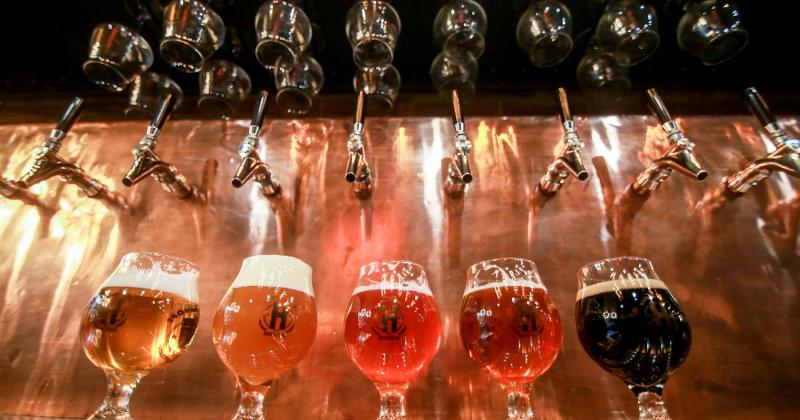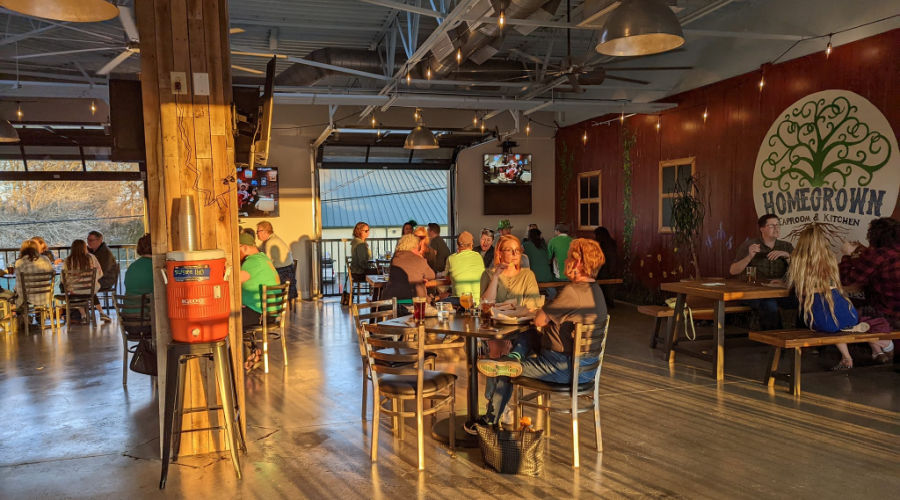
Homegrown Taproom & Kitchen started out to be a craft beer bar, serving food “just to keep people alive,” said owner Jennifer Starks. The bar is the epicenter of the space, and Homegrown’s location in a strip mall in Donelson, Tenn. near the Nashville airport was meant to attract a neighborhood crowd.
But the area also is home to many Airbnbs, often reserved for bachelorette parties that come to Nashville to celebrate. “We gained a reputation as the ‘official’ place for Sunday brunch before the groups took off for the airport,” said Starks. As that opportunity grew, she came up with other ways to grow her business.
Across the U.S., on-premise craft beer sales started slumping before the pandemic and then took a nosedive when drinkers were not congregating in brew pubs and bars as they had in the past. According to Restaurant Business sister company Technomic, the number of operators offering craft beer decreased 1.7% over the last five years. During 2022, growth picked up again, increasing 3.8% but still below the pre-pandemic level.
Starks opened Homegrown eight years ago, and this year she took several initiatives to boost profits. When the storefront next door became vacant, she took it over and created a beer garden in the back, installing garage doors that open up into the space. Then along with two other nearby restaurants, she participated in a regular pub crawl that is promoted by all three.
And the kitchen at Homegrown is no longer serving food “just to keep people alive.”
“This great chef came in looking for a job after the place she was working at in town reverted back to one location,” said Starks. “She brought her recipes with her.” Now the food is a draw too, pushing up beer sales and check averages.
That chef, Angie Moreland, cooks familiar but trend-forward fare and is an expert baker, said Starks. Her rotating desserts are a real crowd pleaser, she added with choices like granola pie, apple crisp, brownies with warm caramel sauce and deconstructed s’mores served in a jar with house-made marshmallows.
“Our kitchen used to be staffed by unskilled cooks who didn’t stick around for long, and now I’m so thankful she is here,” Starks said.

Homegrown took over the vacant space next door and transformed it into a relaxed indoor beer garden with garage doors to the outside. /Photo courtesy of Jennifer Starks.
She’s also thankful for the inventory control technology she installed last fall. “We have 24 taps and previously, we kept inventory manually, shaking the kegs to figure out how much beer was left,” said Starks. “The new BrewLogix system alerts us as to when the kegs are running out and have to be picked up by our distributor. It reduces overhead costs and keeps the staff happy.”
Grind Brew Pub in Glenwood Springs, Colo. sports 20 taps and owner Chris Heinz frequently rotates beers. “Prior to our inventory management tech we had to tip the kegs to test their weight, but now we know exactly when we need a refill and can get it the same day,” he said. That replenishes the more unique microbrews quickly, which has increased sales, and he knows more precisely what’s moving.
“The macro brews, like Bud and Bud Light end up sitting in the keg,” said Heinz.
Keeping it local
Grind’s location in Colorado provides access to top microbreweries and Heinz frequently plans local “tap takeovers,” devoting five or six taps to Colorado beers. Right now, the selection is IPA-heavy and customers are mostly male Millennials.
But the summer also brings a lot of tourists to the area and the town sponsors concerts, outdoor movies and other events. “We were allowed to double our patio size during the pandemic, and that has increased our visibility and traffic,” said Heinz.
Harlem Hops in New York city is all about keeping it local in every facet of the business. “We curate the best of beer brands from the tri-state area to source unique brews,” said co-owner Kim Harris. “We build relationships with brewery owners and that gives us exclusive access to special beers.”
Highlighting these “underdog” and lesser-known brews resonates with Harlem Hops’ customers, who largely come from the same upper Manhattan neighborhood and are very supportive of small businesses. “We make an effort to bring women-owned and BIPOC brands into the bar,” said Harris, who identifies with both groups.
As far as sales go, she sees guests gravitating toward sessionable and lighter craft beers, but her list hits all different palates. Small bites are offered along with the brews, some products supplied by Black-owned companies. Fan favorites include jerk chicken and sausages, as well as empanadas and Goober Pies.
The marketing efforts extend to staging events with Columbia University and City University of New York, as both campuses are neighbors. These include beer education sessions, pairings and tastings—all of which increase visibility and boost sales and traffic.
Harlem Hops also founded a nonprofit called Harlem Hopes, which funds scholarships for neighborhood students wishing to attend historically Black colleges and study hospitality.
“We don’t do gimmicky things,” said Harris, opting instead to provide a welcoming, personal experience where people feel at home.
Members help make our journalism possible. Become a Restaurant Business member today and unlock exclusive benefits, including unlimited access to all of our content. Sign up here.